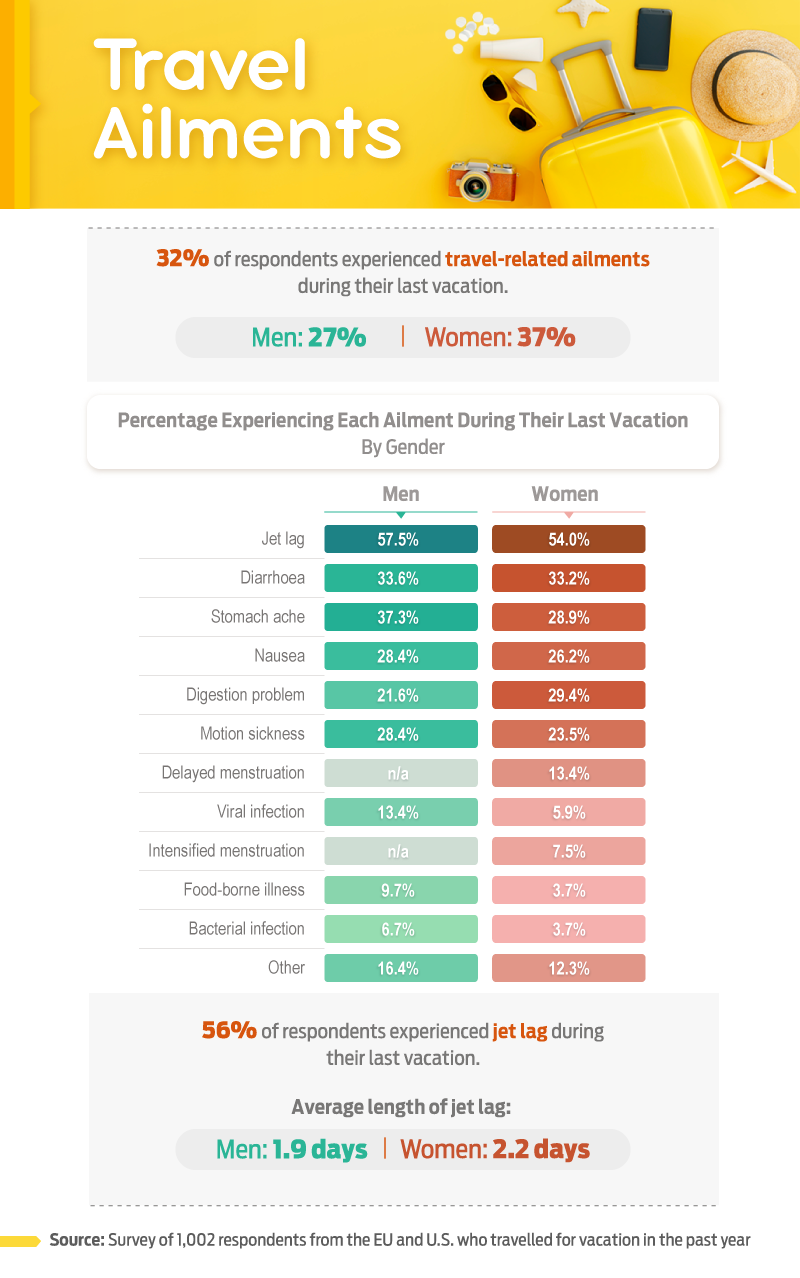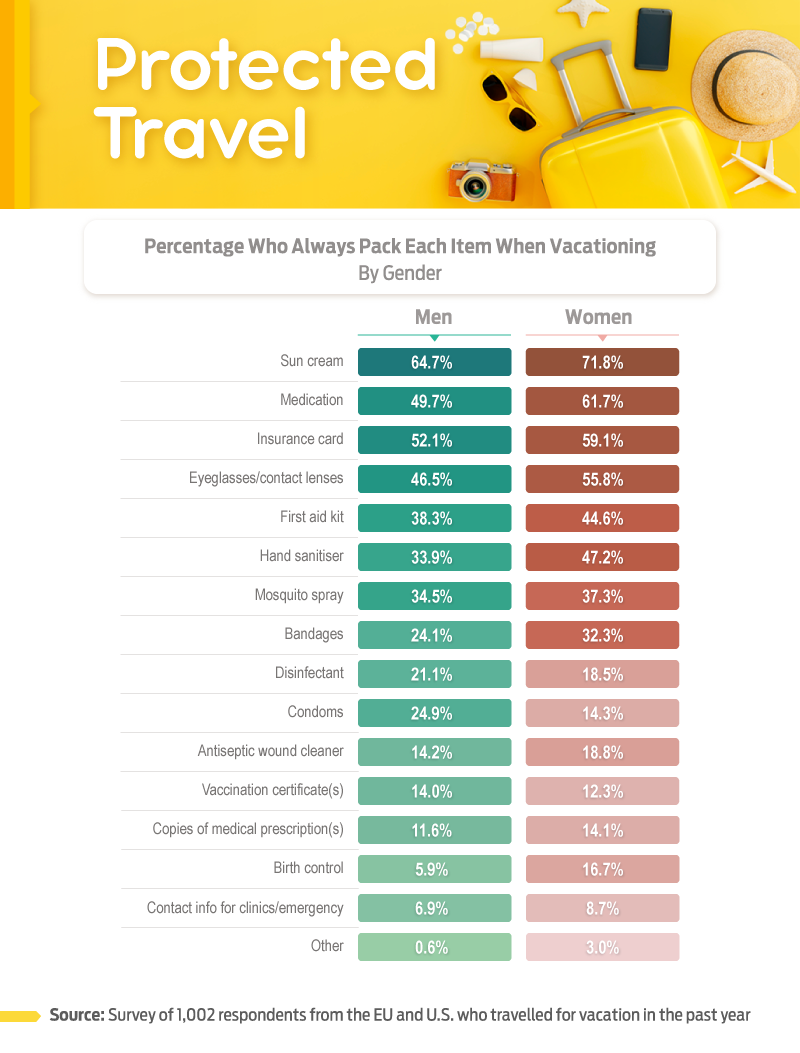
Getting sick during or after travel is extremely common: You can probably thank germ-congested airports, exposure to unfamiliar water, and good old fatigue for that. There is no greater travesty than spending your precious downtime trapped in a hotel room under a mountain of tissues, so we’re going to cover all of the necessary travel prep to stay healthy, happy, and energetic from start to finish.
When you’re far from home and operating outside your regular routine, your body might express its discontent in a few unpleasant ways – in fact, simply taking a flight while you have a cold can lead to long-term health issues for your hearing or sinuses. We surveyed just over 1,000 Europeans and Americans who had travelled for a week or more in the past year to find out which ailments were most common and what you should look out for before you embark on your next adventure.
Travelling Trials and Tribulations
To start, if you’re travelling to a faraway place, make sure you understand exactly which vaccines you’ll need to protect yourself from unforgiving diseases like malaria, yellow fever, and hepatitis. If you’re taking a cruise, there’s a whole other set of rules and precautions you’ll need to know. Of course, no matter where you’re headed, choosing the right SPF sun cream is an absolute must to protect your skin from the sun’s damaging rays.

For both male and female respondents, jet lag was the most commonly experienced side effect of travelling abroad and more than half said that they had suffered the effects of switching time zones. Jet lag can disorient our internal body clock in a major way, so next time you need to jump a few hours forwards or back, here are some techniques and treatments that can help your body acclimate to the change a little faster.
Stomach issues and diarrhoea were also very common among globetrotters, with one-third of both men and women having suffered through the runs while abroad. Another 37% of men and roughly 29% of women reported experiencing general stomach aches.
Travellers’ diarrhoea is typically caused by foreign bacteria, viruses, or protozoa, and people travelling to South America, Africa, and Asia have a particularly high risk of contracting it. While this ailment usually goes away on its own, sometimes you can speed up the process with a specific treatment. Generally avoiding tap water and food that’s been sitting out are solid precautions, and washing vegetables with bottled water is a good rule of thumb as well.
Here’s a quick guide to other frequently reported travel-related ailments, and how to treat them:
- Motion sickness: Always keep your eyes on the horizon; suppress your gagging reflex by controlling your breathing; and avoid smaller planes whenever possible.
- Menstruation issues: Imbalances in cortisol and melatonin can put a period’s schedule on the fritz, among other travel-related changes. If you are on the pill, make sure to take your birth control at the same time as you would at home, not based on your new time zone. You can also delay your period safely with the right medication for a hassle-free holiday.
- Digestion problems: Heartburn, IBS, dehydration, constipation… they’re all bad news for travellers. Some good news though - there is no shortage of fast-acting medications to settle an upside-down stomach while you’re on the go.
Suitcase Staples

From sun worshippers to shade seekers, the majority of our respondents never left home without a bottle of sun cream in their bags. About 65% of men and 72% of women said they always packed UV protection when travelling abroad.
While the thought of applying a layer of sun cream every single day might seem daunting at first glance, it’s one of the simplest and easiest ways to preserve your health – and your youth. Not only can it shield your skin from the sun’s powerful UV rays, but sun cream can also diminish your risk of developing melanoma by up to 50% when used daily, decrease the presence of skin discolouration, and prevent wrinkles and other signs of ageing from forming prematurely. Sounds like an overall win to us!
Most people also packed emergency items like medication, their insurance card, and a first aid kit, as well as standard items like eyeglasses, contact lenses, and hand sanitiser. If you’ve got vacation time booked in the near future, don’t leave home without the essentials: Keep a copy of our holiday checklist by your side while you pack!
Why Visit a Travel Clinic?
Beyond your annual checkup at the doctor’s, there are certain steps you need to take before you travel outside of the country to help protect against location-specific illnesses and diseases. Travel clinics specialise in preventive care for people who are going abroad, from essential vaccinations to jet lag and malaria pills. Our nurses are also available to answer any questions you may have about staying safe and healthy while abroad.
Superdrug’s travel clinic can administer all of the vaccines you need to safely visit a number of foreign countries – you can even search your destination on the website to understand the types of protection you’ll need before you go. Here are a few frequently visited destinations that would probably require a trip to the travel clinic:
- China
- Morocco
- South Africa
- Thailand
- Vietnam
- Indonesia
- Cambodia
- India
We recommend stopping by to see a nurse at least six to eight weeks before your departure date, as some vaccinations require more than one course to be effective. So don’t delay, visit one of our 60+ clinics across the country so you can travel with total peace of mind and enjoy your vacation to the absolute fullest!
If you’re ready to make an appointment, you can use our online booking system to lock in a consultation, though we do ask that you give us a call if you need a yellow fever or hepatitis B vaccination.
Happy, Healthy Holidays
You’re packing your bag, you’re checking it twice, but when it comes to your health, don’t roll the dice – be prepared before you leave town. On top of stomach and digestion-related issues, jet lag was the most common ailment experienced by European and American travellers. The truth is though, you rarely know how your body is going to react to changes in your environment until it’s too late.
Get ahead of potential ailments by visiting Superdrug Online Doctor, your first port-of-call for all things health before, during, and after your travels. From general information to assessments for prescription treatments, Superdrug Online Doctor is the ultimate resource for planning and prevention, providing a wealth of helpful tips as well as a fully stocked online pharmacy.
Methodology and Limitations
For this project, we surveyed 1,002 respondents from the EU and US who travelled for a vacation of one week or more in the past year. 515 respondents lived in the US and 487 respondents lived in Europe. 49.5% of respondents identified as men, and 50.5% identified as women. Respondents ranged in age from 18 to 74 with an average age of 34.8 and a standard deviation of 10.7 years. 776 of the respondents said they travelled by airplane for their last vacation, and 322 of them experienced jet lag during or after the vacation.
Our data relies on self-reporting by respondents and may have certain limitations such as exaggeration, telescoping, and minimisation. No statistical testing was performed, the data was not weighted. The results are merely exploratory.
Fair Use Statement
Do you want to share these findings on vacation travel and travel discomforts with your friends and family? The graphics and information found on this website are available for noncommercial reuse. Feel free to share them as much as you’d like across the web and on social media, but please link back and credit onlinedoctor.superdrug.com. If you have any questions about the data, please contact [email protected].
Sources
- https://www.prevention.com/health/g20453079/travel-mistakes-that-make-you-sick/
- https://www.express.co.uk/travel/articles/868442/flying-ill-plane-cold-flu-symptoms
- https://www.nhs.uk/conditions/jet-lag/
- https://www.thesun.co.uk/travel/7036595/10-best-ways-to-combat-jet-lag/
- https://www.theguardian.com/lifeandstyle/2019/may/26/five-ways-to-manage-travel-sickness
- https://www.health.com/condition/menstruation/travel-affecting-period